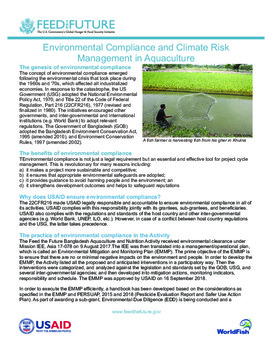Environmental compliance and climate risk management in aquaculture

Citation
WorldFish. (2019). Environmental compliance and climate risk management in aquaculture. Dhaka, Bangladesh: WorldFish. Brochure
The concept of environmental compliance emerged following the environmental crisis that took place during the 1960s and ’70s, which affected all industrialized economies. In response to the catastrophe, the US Government (USG) adopted the National Environmental Policy Act, 1970, and Title 22 of the Code of Federal Regulation, Part 216 (22CFR216), 1977 (revised and finalized in 1980). The initiatives encouraged other governments, and inter-governmental and international institutions (e.g. World Bank) to adopt relevant regulations. The EMMP (Environmental Mitigation and Monitoring Plan)as adopted by WorldFish is to ensure that there are no or minimal negative impacts on the environment and people. In order to develop the EMMP, the Activity listed all the proposed and anticipated interventions in a participatory way. Then the interventions were categorized, and analyzed against the legislation and standards set by the GOB, USG, and several inter-governmental agencies; and then developed into mitigation actions, monitoring indicators, responsibility and schedule. The EMMP was approved by USAID on 16 September 2018.
Permalink
Date Available
Type
Publisher
Countries
Copyright
CC BY 4.0
Research Themes
Topics
Language